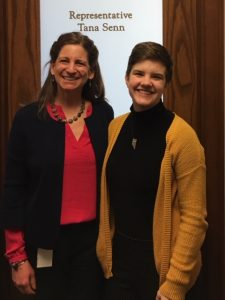I hope you stayed warm and safe during the snowstorm this week. The Legislature was closed Monday, for the first time in anyone’s recent memory. But we are back, doing the people’s work.
Taking care of the care workers
As the Chair of the Human Services and Early Learning committee, I spend a lot of time advocating for the most vulnerable among us: young children, people with disabilities, low-income seniors. The truth is, there is a large group of people who work to care for vulnerable people, focusing on the values of empathy and human dignity. But these care workers are underpaid, overworked, and often don’t have opportunities to advance in their field.
 I am proposing that we begin treating the entire profession of “care workers” as just that, a profession.
I am proposing that we begin treating the entire profession of “care workers” as just that, a profession.
Think supportive living and long-term care workers, special education and mental health providers, early learning educators and case workers, speech and occupations therapists, home visitors and many more people who are caring for our friends, neighbors and loved ones.
None of the care worker jobs can be outsourced to other countries or done by machines, but high stress and low pay mean there is lots of turnover in these fields.
To get this conversation started, I introduced House Bill 1851, which would create a Care Worker Research and Resource Center. This Center would be tasked with collecting and analyzing data, developing career ladders for care workers, and translating workers’ skills from one type of care work to another.
Right now there are too many care fields that are woefully understaffed, and under-resourced, leaving children and vulnerable adults without access to adequate care. Especially given our aging population, these needs are going to continue to rise and we need to begin addressing the workforce shortage now.
Child welfare workers are first responders
In addition to the broad work I am doing to help all care workers, there are steps we can take today within specific care work professions, like child welfare workers.
 Child welfare workers typically see families at their lowest points and there is a growing recognition that case workers are often acting as ‘first responders’ to child abuse and neglect. However, they do not always receive trauma-informed training or enough support given the cumulative stress of their work.
Child welfare workers typically see families at their lowest points and there is a growing recognition that case workers are often acting as ‘first responders’ to child abuse and neglect. However, they do not always receive trauma-informed training or enough support given the cumulative stress of their work.
We need to do more to support child welfare workers. It is the right thing to do, but it is also necessary as the high turnover in this field is costly and harms the very children and families the system is trying to help.
House Bill 1631 recognizes the important work of our child protective services workers and begins to examine workplace culture and supports at the Department of Children, Youth and Families. The bill will require the Department to provide self-care training for child welfare workers to help build their resiliency to the cumulative stress of their jobs. Additionally, under this bill, the Department will incorporate trauma-informed care practices and follow a model of worker supervision that supports and empowers the workers.
When children and families need help, these are the people who step in; it is our turn to step up and take better care of them.
Introducing our intern
 I’m excited to introduce Savannah Heath, my intern for the 2019 legislative session. Savannah is a student at Whitworth University, studying Sociology and Criminal Justice. With a passion for social justice and protecting the environment, they fit right in here!
I’m excited to introduce Savannah Heath, my intern for the 2019 legislative session. Savannah is a student at Whitworth University, studying Sociology and Criminal Justice. With a passion for social justice and protecting the environment, they fit right in here!
The Washington Legislature has a widely acclaimed internship program for college juniors and seniors. Internships are full-time for the legislative session and give students an up-close look at the legislative process. If you know a college student who might be interested in being a legislative intern next year, you can check out more information at the legislative website.
